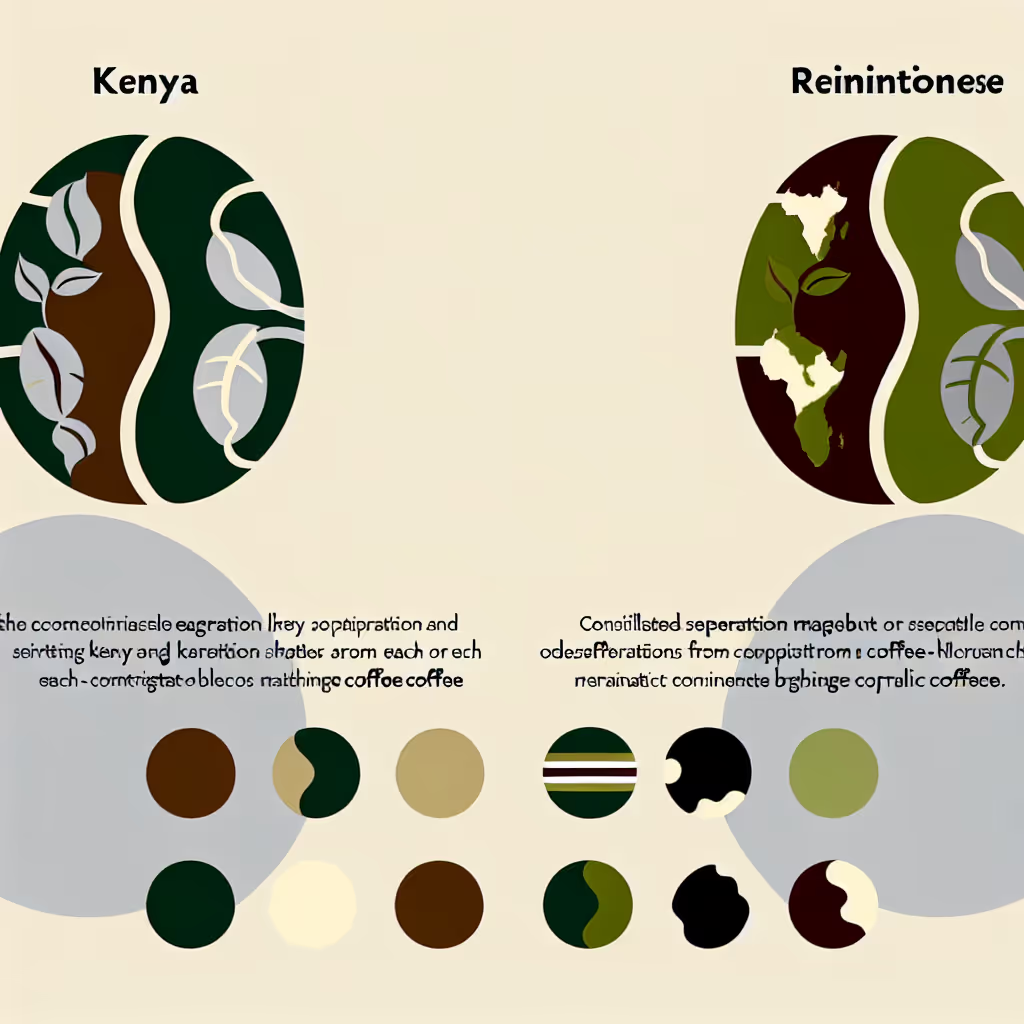Kenyan Vs. Ivorian Coffee
This comparison explores the distinct qualities of Kenyan and Ivorian coffee, highlighting their flavor profiles, growing conditions, and cultural significance in the world of specialty coffee.

Brief Description
Kenyan coffee is renowned for its bright acidity, full body, and complex flavor profile. Grown in the rich volcanic soils of the Central Highlands, these beans benefit from ideal climate conditions and meticulous processing. The result is a cup that's bold, wine-like, and often described as the 'connoisseur's choice'. With notes ranging from blackcurrant to citrus, Kenyan coffee offers a truly unique and memorable tasting experience.
Ivorian coffee, predominantly Robusta, is known for its strong, bold flavor profile. Grown in the lush, tropical climate of Côte d'Ivoire, these beans contribute significantly to the country's economy. While not as internationally renowned as some other African coffees, Ivorian beans are prized for their consistency and are often used in espresso blends and instant coffee production.
Importance of Comparison
Comparing Kenyan and Ivorian coffee is crucial for coffee enthusiasts and buyers seeking to understand the diverse flavors of African coffee. These two origins represent different ends of the spectrum in terms of flavor profile, processing methods, and global reputation. Understanding their differences can help consumers make informed decisions and appreciate the unique characteristics of each region's coffee production.
Key Attributes
Origin
Kenyan
Ivorian


Consumer Guide
When choosing between Kenyan and Ivorian coffee, consider your flavor preferences and brewing methods. Kenyan coffee, known for its bright acidity and complex flavors, is ideal for pour-over and cold brew methods. It's perfect for those who enjoy a bold, wine-like cup with fruity notes. Ivorian coffee, predominantly Robusta, offers a strong, earthy flavor that works well in espresso blends and French press brewing. If you prefer a more intense, full-bodied coffee with chocolate and nutty undertones, Ivorian might be your choice. Consider the altitude difference: Kenyan beans grow at higher elevations (1400-2100m), contributing to their complexity, while Ivorian beans (200-1000m) develop different characteristics. Lastly, think about your budget and availability, as Kenyan coffee is often pricier due to its reputation in the specialty coffee market.
Expert Opinions
Coffee expert Maria Rodriguez notes, 'Kenyan coffee is often considered the pinnacle of African coffee, prized for its vibrant acidity and complex flavor profile. Ivorian coffee, while less celebrated in specialty circles, plays a crucial role in the global coffee industry.' Roaster John Smith adds, 'The double fermentation process used in Kenya contributes to its unique flavor, while Ivorian coffee's natural processing often results in a more straightforward, bold taste. Both have their place in a diverse coffee portfolio.'
FAQs
Kenyan coffee is known for its bright acidity with notes of blackcurrant, citrus, and floral undertones. It has a complex, wine-like flavor profile. Ivorian coffee, on the other hand, tends to have a stronger, more robust flavor with earthy, nutty, and chocolatey notes. The difference in flavor is largely due to the bean varieties grown, altitude, and processing methods used in each country.
Kenyan coffee shines in brewing methods that highlight its complexity, such as pour-over, French press, and cold brew. These methods allow its bright acidity and fruity notes to come through. Ivorian coffee, being predominantly Robusta and having a bolder flavor, works well in espresso machines, French press, and Moka pots. These methods can handle the coffee's strength and bring out its earthy and chocolatey notes.
Kenyan coffee is typically grown at higher altitudes (1400-2100m), which contributes to its complex flavor profile and higher acidity. The cooler temperatures and longer maturation period at these altitudes allow for more flavor development in the beans. Ivorian coffee, grown at lower altitudes (200-1000m), develops different characteristics, often resulting in a less acidic, more full-bodied cup with earthy flavors.
Kenyan coffee is primarily processed using the washed method, often with a unique double fermentation process that contributes to its clean, bright flavor profile. Some Kenyan coffees are also sun-dried. Ivorian coffee, however, is processed using a variety of methods including natural (dry), washed, and semi-washed processes. The natural process, common in Ivory Coast, often results in a more full-bodied, less acidic cup compared to washed coffees.
Ivory Coast produces significantly more coffee than Kenya, with an annual production of around 100,000 metric tons compared to Kenya's 50,000 metric tons. This difference is partly due to Ivory Coast's focus on Robusta production, which generally yields more beans per plant than Arabica. Kenya's lower production volume is offset by its reputation for high-quality specialty coffee, which often commands higher prices in the global market.
Ivorian coffee is generally better suited for espresso due to its Robusta content, which provides a strong flavor and good crema. Its earthy, nutty, and chocolatey notes work well in espresso blends. Kenyan coffee, while excellent, is less commonly used for espresso due to its high acidity and complex flavor profile, which can become overwhelming when concentrated. However, some specialty roasters do create unique espresso blends using Kenyan beans for those who enjoy a bright, fruity espresso.
Conclusion
In comparing Kenyan and Ivorian coffee, we see two distinct expressions of African coffee production. Kenyan coffee, with its high altitude growth, complex processing, and renowned flavor profile, represents the pinnacle of specialty coffee from the continent. It's ideal for those who appreciate bright, complex flavors and are willing to invest in a premium coffee experience. Ivorian coffee, while less celebrated in specialty circles, offers a robust, full-bodied option that excels in espresso blends and provides a consistent, bold cup. It's a great choice for those who prefer strong coffee with chocolate and nutty notes. Ultimately, the choice between these two origins depends on personal taste preferences, brewing methods, and the desired coffee experience.






